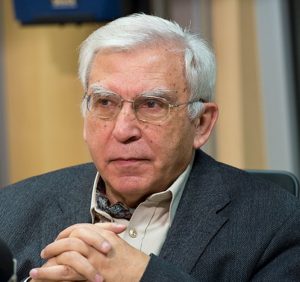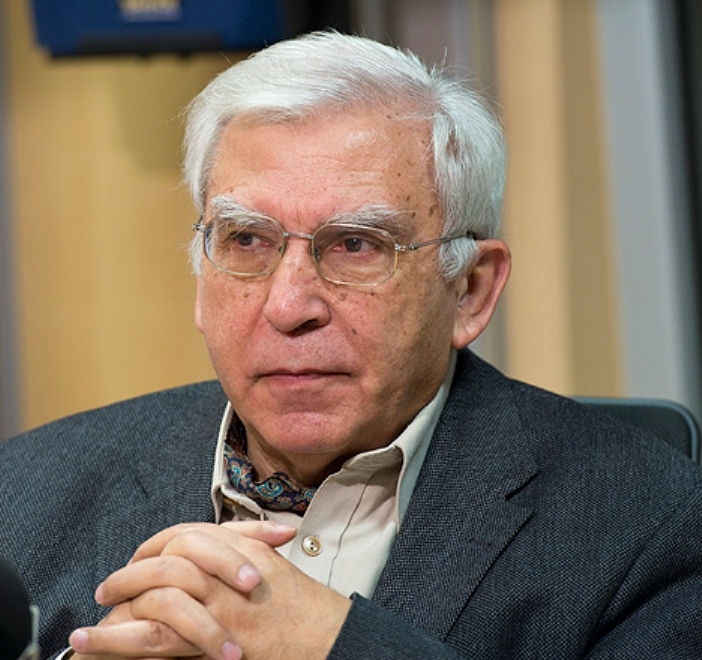
Adam Daniel Rotfeld (1938- ) is a Polish international lawyer and foreign affairs scholar, who was active both as an academic and a legal expert and diplomat. After initially working on German issues and focusing on the principle of self-determination in international law, Rotfeld became in the 1970s a leading expert on the Conference on Security and Co-operation in Europe. Between 1991 and 2002 Rotfeld was Director of the Stockholm International Peace Research Institute (SIPRI), a Swedish think-tank and research institute focusing on conflicts and arms control. He crowned his career as Poland’s Minister of Foreign Affairs in 2005. In 2022 he was still active internationally and domestically in advisory functions in the UN, OSCE and NATO.
He was born on March 4, 1938 in Przemyślany/Peremyshliany near Lwów/Lviv in Western Ukraine, in the then Second Polish Republic. His Jewish parents were murdered during the Holocaust. Rotfeld survived as a child and placed in Unite monastery, as part of a bigger operation of rescuing Jewish children in Galicia organized by the Metropolitan Archbishop of the Ukrainian Greek Catholic Church Andrey Sheptytsky. After arriving in Poland after WWII, Rotfeld graduated from the Diplomatic-Consular Faculty of the Main School of Foreign Service (Szkoła Główna Służby Zagranicznej) in Warsaw. Instead of working in the diplomatic service, in 1961 he began a four-decades long engagement at the Polish Institute of International Affairs (PISM, Polski Instytut Spraw Międzynarodowych), a think-tank and research institute for foreign affairs.
In alignment with the priorities of his state, Rotfeld began his career as a scholar of Polish-German relations and countered the arguments of West German state actors, legal experts, and expellee activists, who used international law to question the validity of the post-war territorial settlements. Rotfeld’s master thesis was devoted to the invalidity of the 1938 Munich Agreement. He argued that Munich cannot serve as a basis for claims for Sudeten Germans against Czechoslovakia. In 1969 Rotfeld broadened this perspective in a dissertation about national self-determination (Prawo narodów do samostanowienia w systemie współczesnego prawa międzynarodowego), which he defended at the Jagiellonian University in Kraków, under the supervision of Stanisław Nahlik (1911-1911).
During the 1970s Rotfeld joined Polish diplomacy and served as an expert and negotiator during the Conference on Security and Co-operation in Europe. He took part in the Geneva (1974), Belgrade (1978), Madrid (1983) and Vienna (1986-1988) meetings. In Warsaw, Rotfeld worked as head of the European Security Department at PISM. His writing during the 1970s and 1980s was dominated by the new multilateralism of the CSCE and he became a top expert on disarmament agreements, respective rounds of CSCE meetings, about which he prepared countless articles, analyses and collections of documents.
The 1989/1991 period was not a major breakthrough in Rotfeld’s career. He earned his habilitation degree in 1990 with a monograph, in which he presented the CSCE process not only as an origin of the peaceful end of the Cold War, but also as a scheme with which a future European security system could be forged. The reunification of Germany according to West German plans did not raise concerns, since Rotfeld believed at the dawn of the 1990s, that the country was anchored in European institutions and bound by international law, and could contribute to European stability. After working for two years at the Stockholm International Peace Research Institute (SIPRI), Adam Daniel Rotfeld was the Institute’s Director between 1991 and 2002.
Thanks to his compromise-oriented stance during state socialism, Rotfeld co-created the post-1989 Western and Atlantic foreign policy consensus in Poland. This consensus was built by reform-minded state servants and diplomats (most of whom, like Rotfeld, had experience with the CSCE process or were involved with relations with the West) and intellectuals: former dissidents at home, as well as émigré thinkers. His experience and networks abroad made him an influential figure in the foreign policy establishment. In January 2005, Rotfeld was appointed Minister of Foreign Affairs and served in the office for ten months. During the 2010s Rotfeld was known as co-chair of the Polish-Russian-Group on Difficult Matters, aimed at historical and political dialogue with the Western-oriented academic elites of the Russian Federation. The Russian Question became ever more present in his later engagements. Adapting to the changing international situation, he moved between embracing a more European solution to security issues and accommodating Russia’s security concerns, to support a stronger US military presence in Eastern Europe seen as a deterrent against Russia.
As a public intellectual Rotfeld championed the Atlantic vision of the world based on liberal democracy, international law and free trade. In this vision of the world, the smaller countries of East-Central Europe could now advance their international position by focusing on education of the elites and engagement with multilateral institution. Looking back at the state socialist heritage in international relations, he lauded Poland’s assertive foreign policy towards West Germany during the 1960s, which he saw as the realization of raison d'être under limited sovereignty. At the same time, he saw no genuine emancipatory potential in Soviet and East European engagement with the Global South. In a 2012 interview Rotfeld claimed that “the Kremlin certainly used anti-colonialism in a cynical and instrumental way and supported the national liberation struggle to pursue its own interests. The nations of Africa, Asia and Latin America were a bargaining chip in conflicts with the West”. 1
Jakub Szumski (Imre Kertész Kolleg Jena)
Bibliography
-
‘Układ Monachijski a Prawo Międzynarodowe’, Przegląd Zachodni, no. 5 (1963)
-
From Helsinki to Madrid: Conference on Security and Co-Operation in Europe : Documents 1973-1983. Warszawa: Polish Institute of International Affairs, 1983
-
Europejski System Bezpieczeństwa in Statu Nascendi (Warszawa: Polski Instytut Spraw Mie̜dzynarodowych, 1990)
-
‘Dillemas of Poland’s Security Policy (1944-1989)’, in International Security in a Time of Change: Threats, Concepts, Institutions, ed. Hans-Joachim Giessmann, Roman Kuźniar, and Zdzisław Lachowski (Baden-Baden: Nomos, 2004)
-
With Anatoly V. Torkunov. White Spots—Black Spots: Difficult Matters in Polish-Russian Relations, 1918–2008. University of Pittsburgh Press, 2015
1. Adam Daniel Rotfeld, W cieniu. 12 rozmów z Marcinem Wojciechowskim (Warszawa: Agora, 2012), 42.


